DATU PAGLAS, Maguindanao (MindaNews / 24 May) — Once a busy hive of activities, the headquarters of banana producer La Frutera, Inc. is now eerily still. Cobwebs hang from the ceilings and mar the view of glass windows, and unkempt grasses have taken over what used to be a well-manicured lawn for decades.
The signage of the company still stands prominently on the side of the highway but the wrought iron gate leading to the offices is closed, a huge tarpaulin announcing the compound is “Temporary (sic) Closed.”
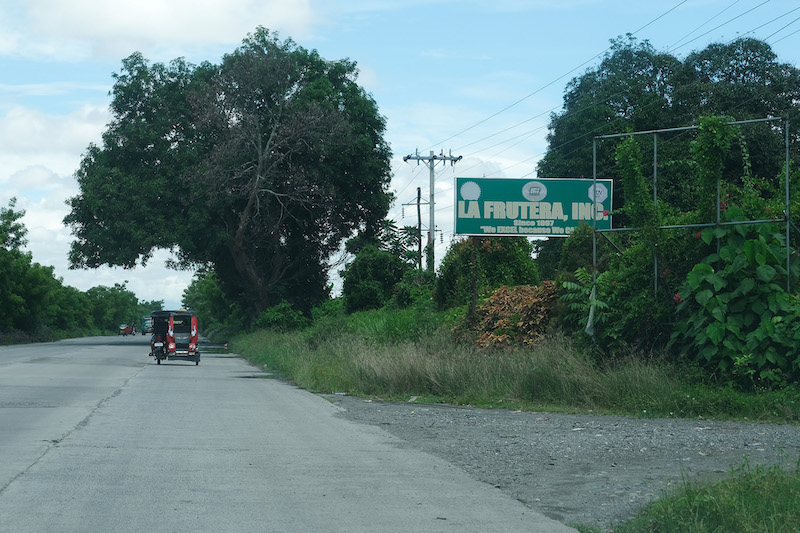 La Frutera, Inc.’s headquarters in Barangay Digal, Buluan, Maguindanao on 19 May 2021. The plantation straddles the towns of Datu Paglas, Buluan, Pandag and Mangudadatu in Maguindanao. MindaNews photo by BONG S. SARMIENTO
La Frutera, Inc.’s headquarters in Barangay Digal, Buluan, Maguindanao on 19 May 2021. The plantation straddles the towns of Datu Paglas, Buluan, Pandag and Mangudadatu in Maguindanao. MindaNews photo by BONG S. SARMIENTO
La Frutera Inc. was established in 1997, the year after the Final Peace Agreement between the government and the Moro National Liberation Front (MNLF) was signed, and easily became the model of an “Arms-to-Farms” success story that was showcased locally and abroad.
The firm stopped operations “for almost two years now,” said Haji Mohamad “Tong” Paglas, Sr., chair of Paglas Corporation, La Frutera’s ancillary service provider and local partner.
At least 2,000 workers lost their jobs, Paglas told MindaNews in his office at the municipal hall on May 19. Paglas is also the incumbent vice mayor. Before this, he served as mayor for three terms.
Datu Paglas town recently hogged the limelight after heavily-armed men belonging to the Islamic State-inspired Bangsamoro Islamic Freedom Fighters (BIFF) briefly occupied the town market in the poblacion on May 8, five days before Eid’l Fitr or the end of the holy month of Ramadan.
The BIFF was founded in March 2010 by Ustadz Amiril Umra Kato who broke away from the Moro Islamic Liberation Front (MILF) where he used to be a commander. The BIFF, however, splintered into three factions after the death of Kato in April 2015.
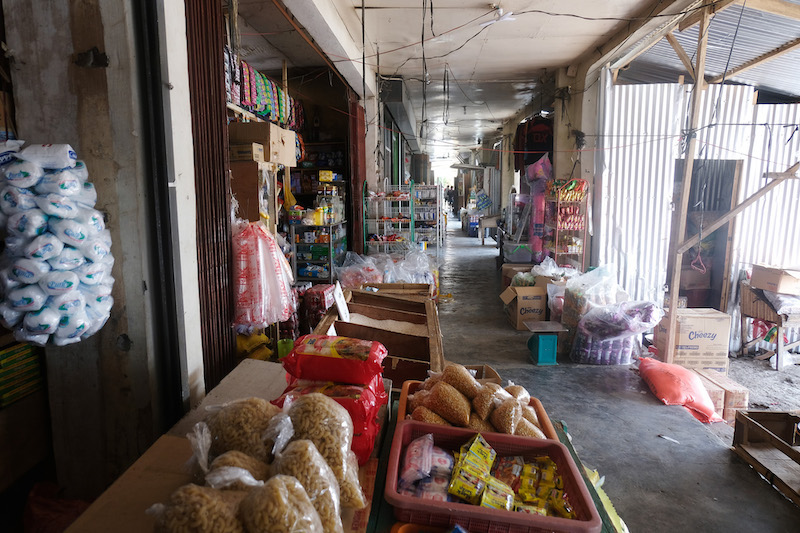 Business operations remain normal at the public market of Datu Paglas, Maguindanao in this photo taken on 19 May 2021. The Bangsamoro Islamic Freedom Fighters (BIFF) occupied the public market on 8 May 2021 but there was no encounter with the military that erupted. MindaNews photo by BONG S. SARMIENTO
Business operations remain normal at the public market of Datu Paglas, Maguindanao in this photo taken on 19 May 2021. The Bangsamoro Islamic Freedom Fighters (BIFF) occupied the public market on 8 May 2021 but there was no encounter with the military that erupted. MindaNews photo by BONG S. SARMIENTO
Paglas said the BIFF under the Karialan faction sowed terror and triggered an evacuation of residents in the poblacion area as they stormed the public market and blocked the highway with a hijacked truck. Some residents in neighboring Tulunan town in North Cotabato also sought refuge in relatives’ houses farther away from Datu Paglas.
Fortunately, there was no encounter in that public space, as the military muzzled their weapons and did not engage the rebels to avoid destroying the building and stalls inside the public market.
Young fighters
Cesar Sailila had just opened the family’s general merchandise store when the armed men, some of them minors, appeared at around 5 in the morning of Saturday, May 8.
“I was face-to-face with three young BIFF fighters, one armed with an M-14 rifle and the two others were carrying Armalite rifles. One of them was as tall as his Armalite,” Sailila recalled.
According to the storeowner, the BIFF fighters did not harm the civilians at the public market and even offered to help him close his store and told him to leave immediately so that he will not be caught in the crossfire in case of an armed encounter with soldiers.
“I was so scared of them I wasn’t able to completely close our store. But when I offered them cigarettes and food, they declined politely. They were fasting,” he said.
The BIFF fighters left the public market after 40 minutes and took a route farther away from the highway, Sailila added.
Paglas said the military engaged the retreating BIFF when they were already at the mango and oil palm plantations about three kilometers from the highway.
The dead bodies of at least four BIFF fighters were recovered following an encounter with the military, which employed aerial bombardments, he added.
Paglas confirmed that some of the BIFF fighters who occupied the public market were minors “15 years old and above.”
The Datu Paglas experience
The BIFF’s brief stay in town disrupted the culture of peace and progress that Datu Paglas town has been enjoying for over two decades since La Frutera established the banana plantation here, thanks to the vision of the late Datu Paglas Mayor Ibrahim “Toto” Paglas III. But it also brought out into the open a problem that was heretofore not publicly known: the closure of the banana firm since 2019.
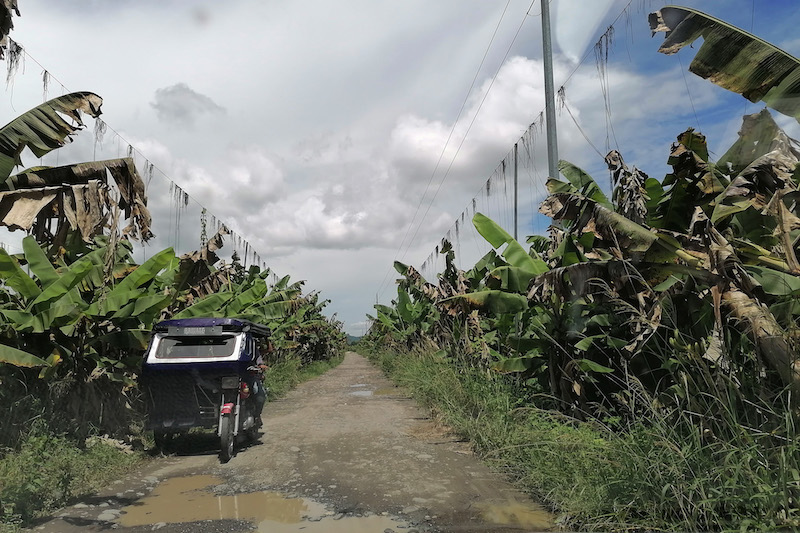 The banana plantation established by La Frutera, Inc. has not been maintained and left to the mercy of nature in this photo taken on 19 May 2021 in Barangay Kayaga, Pandag, Maguindanao. MindaNews photo by BONG S. SARMIENTO
The banana plantation established by La Frutera, Inc. has not been maintained and left to the mercy of nature in this photo taken on 19 May 2021 in Barangay Kayaga, Pandag, Maguindanao. MindaNews photo by BONG S. SARMIENTO
At least 1,200 hectares of land had been developed for the production of table-dish Cavendish bananas since La Frutera’s establishment in 1997. It was the single largest investment in Datu Paglas town and it exported bananas to Asian and Middle East markets.
The firm provided livelihood to at least 2,000 individuals, including members and sympathizers of the Moro National Liberation Front (MNLF) and the MILF. Both fronts waged war against the government since the 1970s but later negotiated and signed peace agreements with the government, the MNLF in 1976 and 1996, the MILF, which broke away from the MNLF in the late 1970s, in 2014 after 17 years of peace negotiations.
Before the banana plantation was established in Datu Paglas and neighboring Buluan, travelers would dread pass the highway due to security issues. The Moro rebellion was raging, unemployment was on the rise and poverty forced many to go into banditry. Ambush incidents were common.
With the birth of the banana industry in his town, Mayor Ibrahim “Toto” Paglas III, grandson of the late Senator and retired General Salipada K. Pendatun and nephew of MILF founding chair Salamat Hashim, exhorted his constituents to strive to be productive. He put up signages proclaiming “Bawal and Tamad sa Datu Paglas” (Laziness is not allowed in Datu Paglas), patterned after then Olongapo mayor Richard Gordon’s “Bawal ang Tamad sa Olongapo.”
Just outside the municipal hall along the national highway, the message is spelled out in colorful, huge letters.
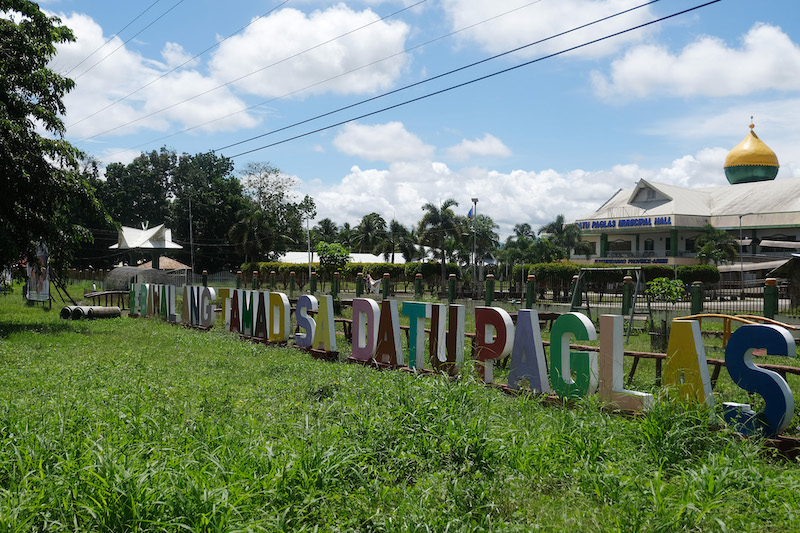 “Bawal ang Tamad sa Datu Paglas” was promoted by the late Datu Paglas Mayor Ibrahim “Toto” Paglas III. The signages with this message can be found in strategic areas such as the municipal hall compound in this photo taken 19 May 2021. MindaNews photo by BONG S. SARMIENTO
“Bawal ang Tamad sa Datu Paglas” was promoted by the late Datu Paglas Mayor Ibrahim “Toto” Paglas III. The signages with this message can be found in strategic areas such as the municipal hall compound in this photo taken 19 May 2021. MindaNews photo by BONG S. SARMIENTO
Months before he succumbed to an illness on August 7, 2008, Toto Paglas described before a youth gathering at the Mindanao State University in Marawi City the Datu Paglas experience as a “living model of how lasting peace can be attained through sustainable economic development.”
“I came to a realization that the people in my town deserved a better life, a peaceful place to live in, a life that at least can provide food and shelter for the family and education for the children. In order to do this, we have to be economically developed, our poor villages and lands have to be productive,” he said.
“My town cannot continue to be a fertile breeding ground to terrorism and other forms of criminality and lawlessness, or theaters to war and rebellion,” he vowed.
The Senate passed a resolution on August 27, 2008 honoring and remembering Toto Paglas for his “unparalleled dedication in bridging the gaps created by conflict and poverty, and his outstanding contribution to peace and economic development through acceptance of diversity and enlightened leadership.”
In the book “Fifty Years, Fifty Stories” published by the East West Center, Senen Bacani, La Frutera president and former Agriculture Secretary, was quoted as saying: “We cannot keep waiting for peace to come first. The reason there is no peace is that there is no development. Only real development can bring about an enduring peace.” The success of La Frutera was discussed in the article titled “Sowing the Seeds of Peace and Development.”
Fertile ground for recruitment by IS-inspired groups
Vice Mayor Paglas, Paglas Corporation’s chair and brother of the late Mayor Toto Paglas, said LaFrutera stopped operations due to its failure to access a bank loan to finance its operations and expansion plans.
He expressed concern over a possible return of the bloody past if the problem of unemployment is not addressed.
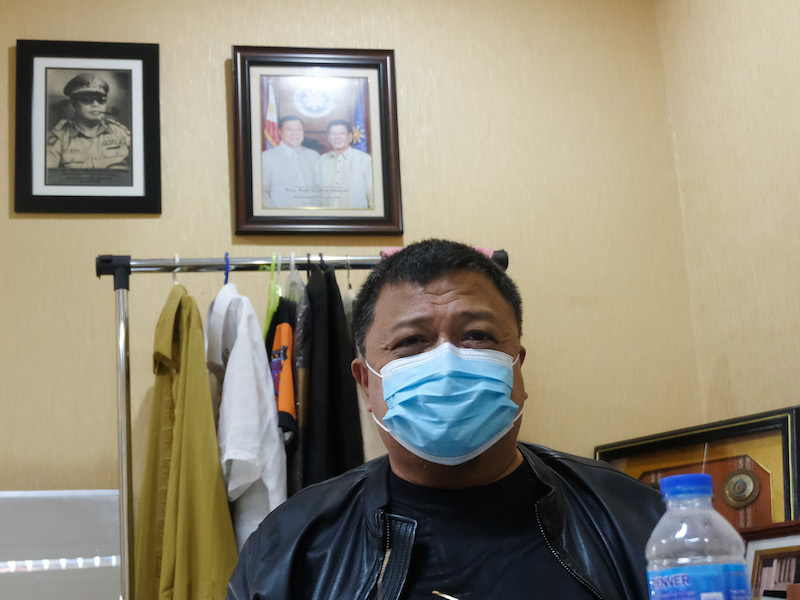 Mohamad “Tong” Paglas, Sr. (Al Haj), Datu Paglas Corp. chair and Vice Mayor of Datu Paglas, Maguindanao, talks about fears of continued closure of the banana firm and efforts to revive the industry in his town in a sit-down interview with MindaNews on 19 May 2021. MindaNews photo by BONG S. SARMIENTO
Mohamad “Tong” Paglas, Sr. (Al Haj), Datu Paglas Corp. chair and Vice Mayor of Datu Paglas, Maguindanao, talks about fears of continued closure of the banana firm and efforts to revive the industry in his town in a sit-down interview with MindaNews on 19 May 2021. MindaNews photo by BONG S. SARMIENTO
Paglas explained that the IS-inspired BIFF faction is taking advantage of the hopelessness, disgruntlement and poverty of those who lost their jobs. They and their family members are vulnerable to recruitment by this group.
He said Solaiman Tudon, one of the top leaders of the BIFF who hails from Datu Paglas town, has been recruiting young Muslims in town, indoctrinating them with wrong tenets of Islam, like having a place in paradise if they kill in the name of religion.
Tudon, a former chair of the Sangguniang Kabataan in Barangay Poblacion here, is married to a niece of Muhiddin Animbang alias Kagui Karialan, the head of the BIFF-Karialan faction.
Paglas said they monitored about 100 BIFF fighters entering Datu Paglas town two days before they occupied the public market, to seek refuge in their relatives’ homes.
They retreated to Datu Paglas town due to the relentless operations conducted by the military at the SPMS Box, which refers to the contiguous towns of Shariff Aguak, Pagatin (Datu Saudi Ampatuan town), Mamasapano and Shariff Saydona, he added.
Revival efforts
Despite the closure of La Frutera, Paglas said they have been looking for other ways to help save the banana industry here.
Although the foreign markets have disappeared, the bananas grown here and in the neighboring towns are sold in the local markets or to a big flour manufacturer, at a low farm gate price of five pesos per kilo.
Paglas said current local prices are a far cry from the $6.50 (P311 at current rates) price tag for a 13-kilogram box bound for the Japanese market.
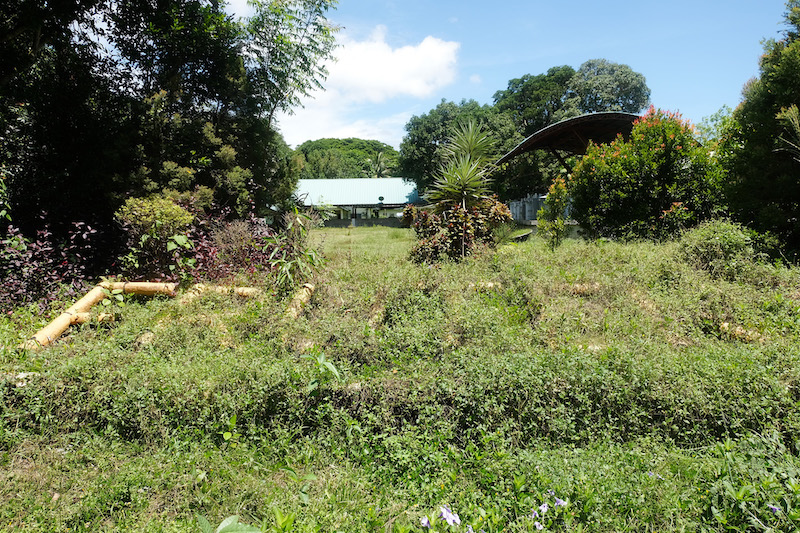 The letters “La Frutera, Inc.” can hardly be seen as grasses have covered what used to be a well-manicured lawn at its headquarters following the stoppage of operations in 2019. MindaNews photo by BONG S. SARMIENTO
The letters “La Frutera, Inc.” can hardly be seen as grasses have covered what used to be a well-manicured lawn at its headquarters following the stoppage of operations in 2019. MindaNews photo by BONG S. SARMIENTO
Since La Frutera ceased operations, the bananas are left at the mercy of nature to survive, grasses growing between the plants.
Paglas disclosed that Paglas Corporation has been negotiating with the state-owned Development Bank of the Philippines (DBP) for a loan to revive the local banana industry, presenting to bank officials their rehabilitation plan during a meeting in General Santos City on May 18.
“We are praying for its approval to jumpstart the local banana industry again. We need to provide jobs to our people,” he said. “If they are not productive and don’t have enough money to feed their families and send their children to school in the long-term, I am afraid they will easily fall prey to the recruitment of Islamic State militants.”
Paglas Corp. is planning to revive the banana plantation for the export market on a staggered basis once DBP approves the loan application, he said, adding they estimate the rehabilitation cost at 750,000 pesos per hectare.
Of the total 1,285 hectares of banana plantation, the Paglas family controls 576 hectares or 44.8% and the rest is owned by contract growers.
“The Paglas Corporation, after over 20 years of partnership with La Frutera, is capable of managing the banana plantation,” Paglas said.
“But we need a big capital to do this, that’s why we sought the help of the government-owned bank, which we hope will act favorably so the legacy of my brother Toto Paglas will not go to waste,” he said.
Bananas for Peace
Displaced workers are also keeping their fingers crossed that the local banana industry will become robust again.
“The banana industry helped a lot of families get out of poverty. Many of us were able to build better houses and send our children to school,” said Kagui Ankad Saguia, a former MILF fighter who was hired as security personnel in the infancy of La Frutera.
“We feel bad that the company ceased operations. It was very instrumental in bringing and sustaining peace around here. Many MILF members went back to the fold of the law because of the livelihood provided by the banana industry,” he told MindaNews at a security outpost surrounded by abandoned banana farms in Barangay Kayaga in nearby Pandag town.
Saguia said the workers were shocked when the company abruptly stopped operations, adding he still has some collectibles from their employer.
“I hope the banana industry will be revived for the sake of peace and welfare of our people,” he said. (Bong S. Sarmiento / MindaNews)
